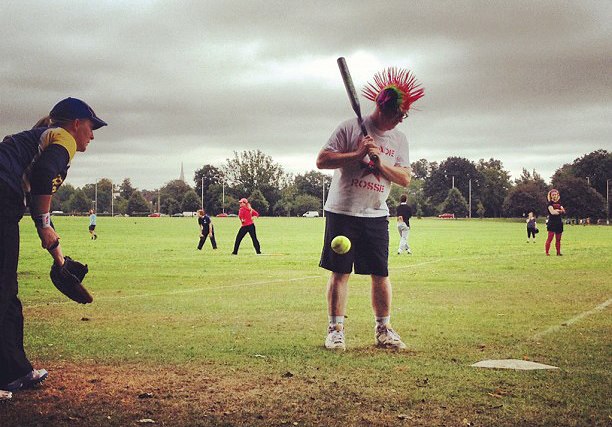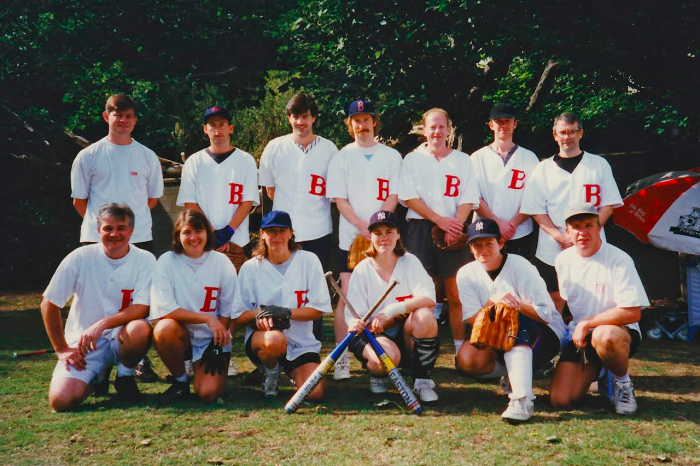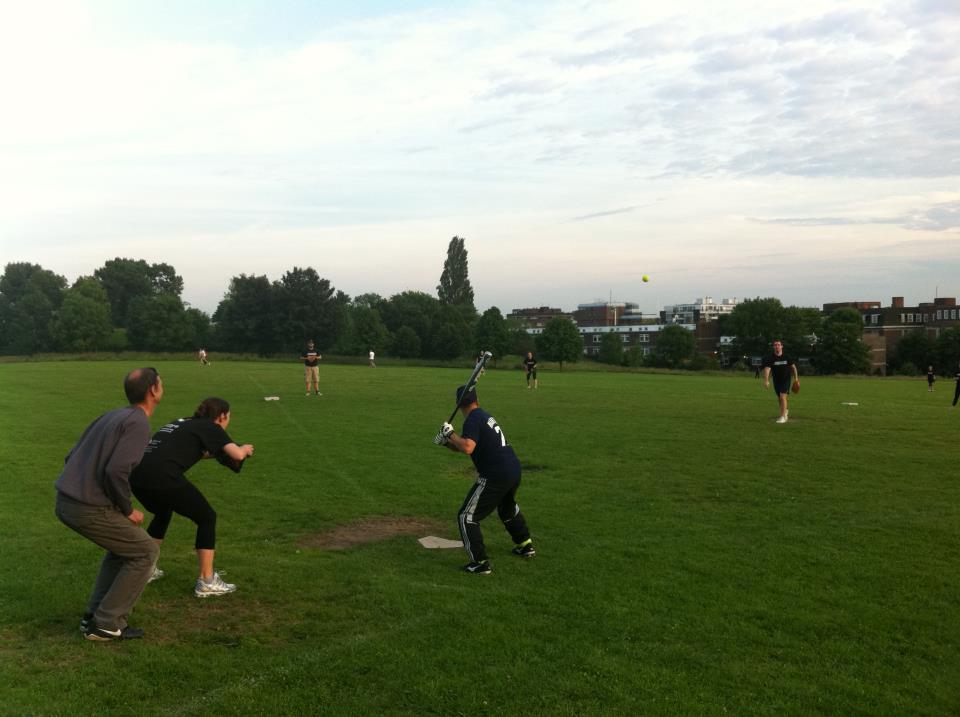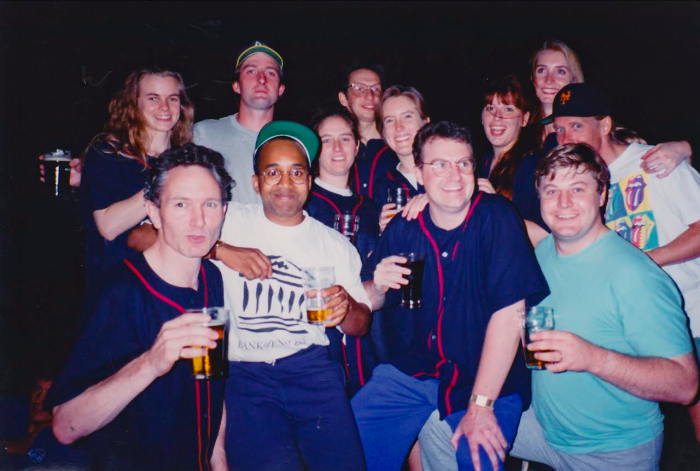Another milestone in British softball has been reached by the Publishers Softball League in London, which has now played for 30 consecutive seasons. Below, BSF Hall of Famer David Ballheimer, who has been with the league almost since it began, recounts the story.
Softball’s success in the UK – along with American football and basketball too – owes everything to three events: first, Freddie Laker’s low-cost transatlantic airline (which sadly went bust after only a few years); second, the arrival on our television screens of Channel 4, the station given its franchise partly because of its promise to show sports out of the mainstream; and third, Richard Branson’s Virgin airline, which has stood the test of time and brought travelling to America within reach of many more people’s pockets. Without the cheap flights and the television exposure, American sports would have remained pretty much the domain of the ex-pat and a few hardened fans.
One of the small side effects of all this is that the Publishers Softball League will start its 31st season in a couple of months' time, an amazing achievement for a league which limits itself to a single trade.

Beginnings
It all began in 1985, with an ad hoc and rather unorganised Publishers Softball League. The dozen or so teams played friendlies – some one or two while others, such as the Batsford Bats, played close to 20. If scores were kept, it was only for in-house purposes and there was no official table.
Over the 1985-86 off-season things got more organised and a four-team competitive league started in 1986. All the games were played in Hyde Park, which was then the centre of the softball universe, despite unmarked pitches and most teams playing without bases and owning limited equipment.
Things moved rapidly forward in 1987, as the league obtained sponsorship for its end-of-season one-day tournament. The sponsor was Horace Bent, the column which has for years filled the back page of the “Organ of the Book Trade”, The Bookseller. One of the new teams was Pavilion and they included their chairman at first base, now Sir Tim Rice. Tim, as he was back then, was a keen player and on one memorable evening, the entire team decamped from the company’s stretch limo.
The league continues to get sponsorship of sorts: Random House’s Head of Publicity – she played second base – persuaded their regular post-match watering holes to provide them with free food and this was extended across the league. For the past four seasons, the Princess of Wales in Chalcott Street, Primrose Hill, has been our kind hosts, and they have looked after us royally at our end-of-season party.

Pioneers
But going back to those early days, another player making his debut in the mid-1980s, for Grafton/Collins/Harper Collins, was Russell Porter, who had been a keen rounders player in Hyde Park and wondered what this game was about with the giant balls and huge bats. He quickly became hooked.
My debut was less happy. Octopus took on the PSL’s top team, the Orbis Ballstars, and the game was close for at least a couple of pitches. By the time the final out was recorded, the score stood at 96–3 (ok, we played nine innings in those days). Whereas Russell was a natural talent and one of the best pitchers in England, my level was … well, very keen, couldn’t hit, couldn’t run, limited fielding range, adequate glove, great rules awareness.
Golden age
The PSL moved forward apace and in 1989, the first International Publishing All-Star game was played. It was Russell’s brainchild, he got sponsorship from the London International Book Fair and, on the Saturday before the Fair started, a group of Americans took on the PSL All-Stars. That first year, the PSL had a squad of 20 players, while the USA mustered seven.
Other ventures into unknown territory followed, including more than 20 years of playing at the Edinburgh Festiball in August and, in the same month, a tournament in Belgium.
By the early 1990s, the PSL was at its largest ever, boasting more than two dozen teams, peaking at 30. Vee Mott and Ian Kingston, both of the Batsford Bats, were among the earliest league officials, as were Russell Porter and Mark Handsley of Penguin. In the mid-1990s, the mantle fell on the shoulders of Nigel Davies of the Titan Terminators. Nigel, Russell and I all shared the honour of being elected to the British Softball Hall of Fame in the same year, quite an achievement for the Publishers Softball League and proof we must have been doing something right.
Nigel took on the PSL’s weekly newsletter, Touching Base, a publication which highlighted all that was good in publishers playing softball. My limited skills having deteriorated further, my positions were now umpire, coach, scorer and fixtures secretary. I am inordinately proud of the fact that in 20 years of PSL umpiring I had exactly zero ejections.

Contraction
As the publishing world contracted, however, so did the league. Mike Brown took on the League Presidency, a role he fulfilled with great gusto and energy before the lure of a job in the Middle East took him away. In his place now is another man who has contributed magnificently to the Publishers Softball League, Ross Whamond, a self-confessed “softball tart”, one who will play for any team at any time.
But in the last few years, with companies closing down their sports and social sections, most teams have had to become self-funded, and this is far from cheap, with gloves, bats, balls, bases and, most expensively, pitches to pay for. The league continues to run with between 10 and 12 members – a far cry from the early 1990s but proof that there is still a love for softball and that players are happy to turn out once a week for an evening of sport and socialising.
Triumph
Apart from authors, famous players in PSL history include Sir Tim Rice, a member of a successful 1980s girl band (pre-Spice Girls) and, more recently, comedian Rich Hall, who would walk through Regents Park just looking for a game. The PSL is not a dating agency, but there have been more than half-a-dozen marriages following relationships across the diamond.
So the Publishers Softball League is either 30 this year or in its 31st season. Either way, it is a triumph to have survived so long!

